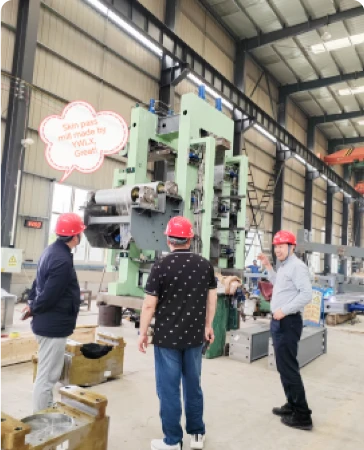
Agc System For Hot/Cold Strip Rolling Mill
Feb . 15, 2025 08:42
Back to list
Agc System For Hot/Cold Strip Rolling Mill
In the dynamic world of industrial machinery, the evolution of automated controls has significantly enhanced operational efficiency and accuracy. One of the most advanced innovations in this realm is the automatic hydraulic gauge control system. With its precision and reliability, this system stands out as a critical element in modern industrial applications. Here, we delve into the intricate world of automatic hydraulic gauge control, highlighting its features, benefits, and the impact it has on various industries.
Real-world experience from industries employing automatic hydraulic gauge control systems demonstrates their tangible benefits. In manufacturing, for instance, these systems maintain precise material thickness, which is crucial for producing high-quality products. In the automotive industry, accurate gauge control ensures that vehicles are built to exact specifications, contributing to safety and performance. Similarly, in aerospace, the need for exact measurements is critical, and these control systems ensure adherence to stringent industry standards. The integration of automatic hydraulic gauge control systems is marked by several key features that set them apart. These systems can be integrated seamlessly into existing infrastructure, supported by user-friendly interfaces that allow operators to efficiently manage and adjust settings as needed. Furthermore, the durability and reliability of these systems ensure they can withstand harsh industrial environments without compromising performance. Furthermore, the environmental impact of using automatic hydraulic gauge control systems is noteworthy. By enhancing operational efficiency, these systems contribute to reduced energy consumption and waste, aligning with the growing demand for sustainable industrial practices. The precision offered by these systems minimizes material wastage, thus playing a crucial role in promoting eco-friendly manufacturing processes. Continuous innovation and research in hydraulic technology promise to develop even more sophisticated gauge control systems in the future. Advances in digital technologies, such as IoT and AI, are expected to further enhance the capabilities of these systems, offering smarter, more responsive, and efficient solutions for a broader range of industrial applications. In conclusion, automatic hydraulic gauge control stands as a cornerstone of modern industrial automation. Its integration offers unparalleled precision, reliability, and efficiency, making it indispensable across various high-stakes industries. The system's ability to maintain critical operational standards not only boosts productivity and reduces costs but also ensures compliance with industry regulations and standards. As industries continue to evolve, the role of such advanced control systems will become increasingly significant, reaffirming their status as essential tools in the industrial landscape.


Real-world experience from industries employing automatic hydraulic gauge control systems demonstrates their tangible benefits. In manufacturing, for instance, these systems maintain precise material thickness, which is crucial for producing high-quality products. In the automotive industry, accurate gauge control ensures that vehicles are built to exact specifications, contributing to safety and performance. Similarly, in aerospace, the need for exact measurements is critical, and these control systems ensure adherence to stringent industry standards. The integration of automatic hydraulic gauge control systems is marked by several key features that set them apart. These systems can be integrated seamlessly into existing infrastructure, supported by user-friendly interfaces that allow operators to efficiently manage and adjust settings as needed. Furthermore, the durability and reliability of these systems ensure they can withstand harsh industrial environments without compromising performance. Furthermore, the environmental impact of using automatic hydraulic gauge control systems is noteworthy. By enhancing operational efficiency, these systems contribute to reduced energy consumption and waste, aligning with the growing demand for sustainable industrial practices. The precision offered by these systems minimizes material wastage, thus playing a crucial role in promoting eco-friendly manufacturing processes. Continuous innovation and research in hydraulic technology promise to develop even more sophisticated gauge control systems in the future. Advances in digital technologies, such as IoT and AI, are expected to further enhance the capabilities of these systems, offering smarter, more responsive, and efficient solutions for a broader range of industrial applications. In conclusion, automatic hydraulic gauge control stands as a cornerstone of modern industrial automation. Its integration offers unparalleled precision, reliability, and efficiency, making it indispensable across various high-stakes industries. The system's ability to maintain critical operational standards not only boosts productivity and reduces costs but also ensures compliance with industry regulations and standards. As industries continue to evolve, the role of such advanced control systems will become increasingly significant, reaffirming their status as essential tools in the industrial landscape.
Latest news
-
Indian Clients Visit YWLX to Inspect Skin-pass MillNewsJun.22,2025
-
Typical Products from Reversing Cold Rolling ProcessNewsMay.26,2025
-
Surface Finish Improvement through Skin Pass RollingNewsMay.26,2025
-
Integration of AGC Systems in Modern Cold Rolling MillsNewsMay.26,2025
-
Cold Rolling in the Context of High-Strength Steel DemandNewsMay.26,2025
-
AGC in Hot Rolling Mills: Challenges and SolutionsNewsMay.26,2025
-
Why Reversing Cold Rolling Mills Are Ideal for Specialty MetalsNewsMay.13,2025
Related Products










